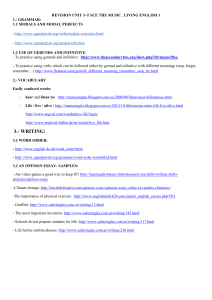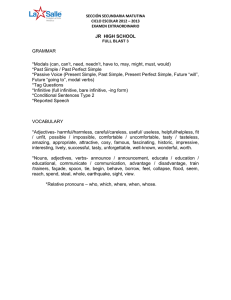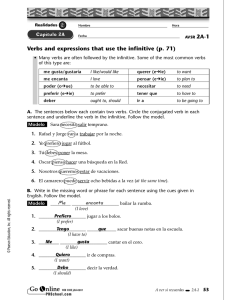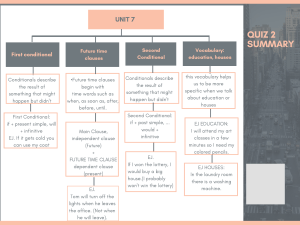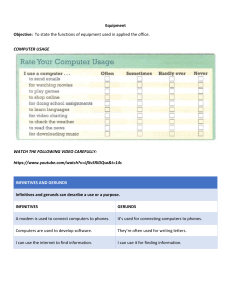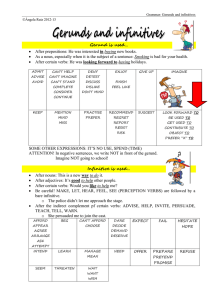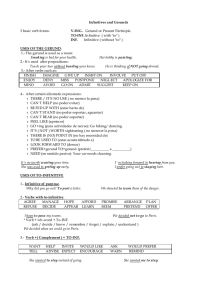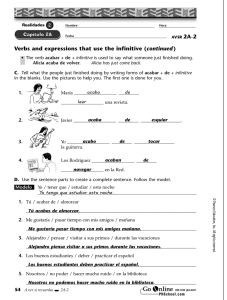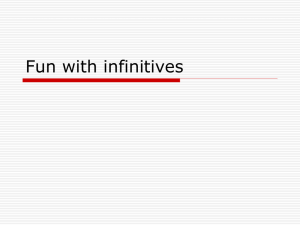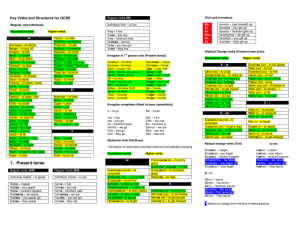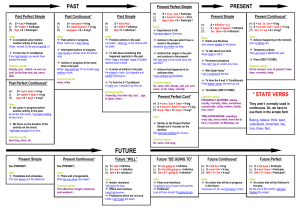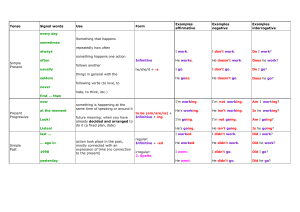1 GRAMMAR GERUNDS AND INFINITIVES Learning how to use
Anuncio
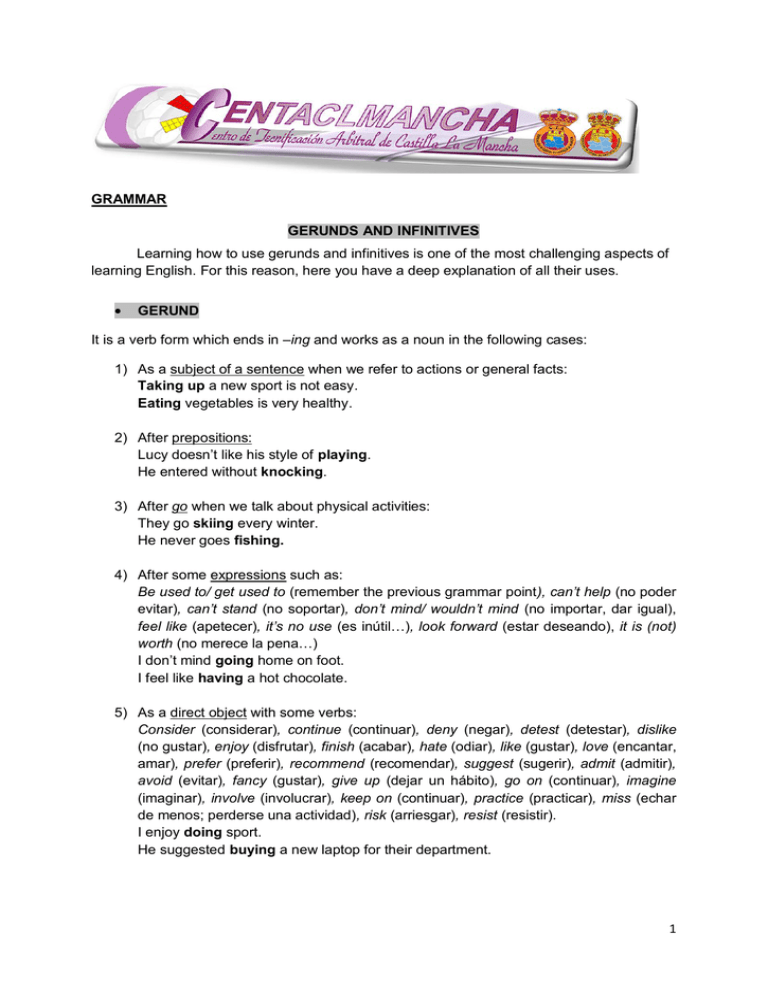
GRAMMAR GERUNDS AND INFINITIVES Learning how to use gerunds and infinitives is one of the most challenging aspects of learning English. For this reason, here you have a deep explanation of all their uses. GERUND It is a verb form which ends in –ing and works as a noun in the following cases: 1) As a subject of a sentence when we refer to actions or general facts: Taking up a new sport is not easy. Eating vegetables is very healthy. 2) After prepositions: Lucy doesn’t like his style of playing. He entered without knocking. 3) After go when we talk about physical activities: They go skiing every winter. He never goes fishing. 4) After some expressions such as: Be used to/ get used to (remember the previous grammar point), can’t help (no poder evitar), can’t stand (no soportar), don’t mind/ wouldn’t mind (no importar, dar igual), feel like (apetecer), it’s no use (es inútil…), look forward (estar deseando), it is (not) worth (no merece la pena…) I don’t mind going home on foot. I feel like having a hot chocolate. 5) As a direct object with some verbs: Consider (considerar), continue (continuar), deny (negar), detest (detestar), dislike (no gustar), enjoy (disfrutar), finish (acabar), hate (odiar), like (gustar), love (encantar, amar), prefer (preferir), recommend (recomendar), suggest (sugerir), admit (admitir), avoid (evitar), fancy (gustar), give up (dejar un hábito), go on (continuar), imagine (imaginar), involve (involucrar), keep on (continuar), practice (practicar), miss (echar de menos; perderse una actividad), risk (arriesgar), resist (resistir). I enjoy doing sport. He suggested buying a new laptop for their department. 1 Gerunds in negative sentences = NOT + verb –ing He hated not passing his exams. He resisted not eating sweets. ‘TO’ INFINITIVE It is a verb form preceded by to and it is used in these cases: 1) After some adjectives and adverbs: She was glad to see her. *It was difficult for us to pass the exam. (for + object+ ‘to’ inf.) *It is very kind of you to help me. (of + object+ ‘to’ inf.) I woke up early to arrive to the train station on time. 2) After nouns: It is a pleasure to meet you. It is time to go home. 3) To express purpose: She bought me this book to learn English. This tool is to make holes on the wall. 4) After wh- words: I don’t know where to go or what to do. *I don’t know why she left. 5) After would + like/ love/ prefer: I would love to go with you. I would prefer to stay here longer. 6) After expressions with too (demasiado) and enough (lo suficiente): He is too short to reach the top shelf. He isn’t tall enough to reach the top shelf. 7) After some verbs such as: Agree (estar de acuerdo), appear (aparecer), choose (elegir), decide (decidir), expect (esperar, tener la esperanza de que ocurra algo), hope (similar a expect), learn (aprender), plan (planear), promise (prometer), refuse (negarse), seem (parecer), want (querer), wish (desear), afford (permitirse algo), attempt (intentar), fail (fracasar, suspender), help (ayudar), manage (arreglárselas), need (necesitar), offer (ofrecer), prepare (preparar), pretend (fingir). He promised to study harder. He decided to try Japanese food. 2 8) Verbs + object + ‘to’ infinitive: Advise (aconsejar), help, invite (invitar), persuade (convencer), teach (enseñar), tell (contar), warn (advertir), allow (permitir), ask (preguntar; pedir), encourage (animar), expect, order (ordenar), recommend, remind (recordar), want. He invited me to join them. She wants us to stay longer. Infinitives in negative sentences = NOT + ‘to’ infinitive He agreed not to drink alcohol. I warned Lucía not to go alone. BARE INFINITIVE OR INFINITIVE WITHOUT ‘TO’ 1) After modal verbs: Can, could, may, might, must, shall, will, would, should, needn’t. You must be here at 10 o’clock. I may go to the shop to buy some fruit. 2) After make/ let + object: (hacer que alguien haga algo/ permitir) The film made me cry. I let Sally come with us. 3) After see, watch, smell, hear: (ver, observar, oler, oír) I saw him play. (Lo vi jugar todo el partido) *They are also followed by –ing and there is a change of meaning: I saw him playing. (Lo vi jugar sólo un rato del partido) VERBS FOLLOWED BY GERUNDS AND INFINITIVES 1) Begin (empezar), forbid (prohibir), intend , propose (proponer) and start (empezar): They started to answer/ answering the letters. (mismo significado) 2) REMEMBER/ FORGET/ REGRET: (acordarse/ olvidar/ arrepentirse) (cambio de significado) o + ‘to’ infinitive = acción futura Remember to post the letter. Sorry, I forgot to buy milk. I regret to tell you the news. o + -ing = hecho pasado He remembered seeing that film. He will never forget flying the Alps. I regret buying this dress. 3 3) STOP: (cambio de significado) o + ‘to’ infinitive = parar temporalmente para hacer otra cosa He stopped to get some petrol. o + -ing = parar definitivamente; terminar; dejar un hábito He stopped doing his homework at nine pm. WORKSHEET 1) Choose the correct form of the verbs (infinitive or gerund). - I am keen on……………………. (work) in the computer industry. Amy decided…………………….. (see) a doctor. Leila enjoys…………………….. (read) love stories. Do you intend…………………….. (learn) Italian or English? Do you mind…………………….. (help) me wash the dishes? Alan asked…………………….. (talk) to the boss. I can't help…………………….. (laugh) when I watch Mr Been. If Sara keeps…………………….. (come) to work late, she'll have problems with the boss. Liza hates…………………….. (study) Maths. Are you interested in…………………….. (live) in África ? 2) Rephrasing: Finish these sentences writing down a suitable –ing or infinitive verb form without changing the meaning of the original sentence: Example: Andrew gave up smoking last January -> Andrew stopped smoking last January. - Peter is sure that he posted the letter yesterday. Peter remembers ……………………………………………………………… - I liked to read the novel. I enjoyed ………………………………………………………………………….. - Please, remember to post this letter. Please, don’t forget .…………………………………………………………….. - Don’t sing the same song again: Stop ………………………………………………………………………………… - ‘I will do it’, she said. She promised …………………………………………………………………….. - Ellen didn’t have enough money for the ticket. Ellen couldn’t afford ……………………………………………………………… - ‘I will not help!’, said John. John refused ……………………………………………………………………… 4
